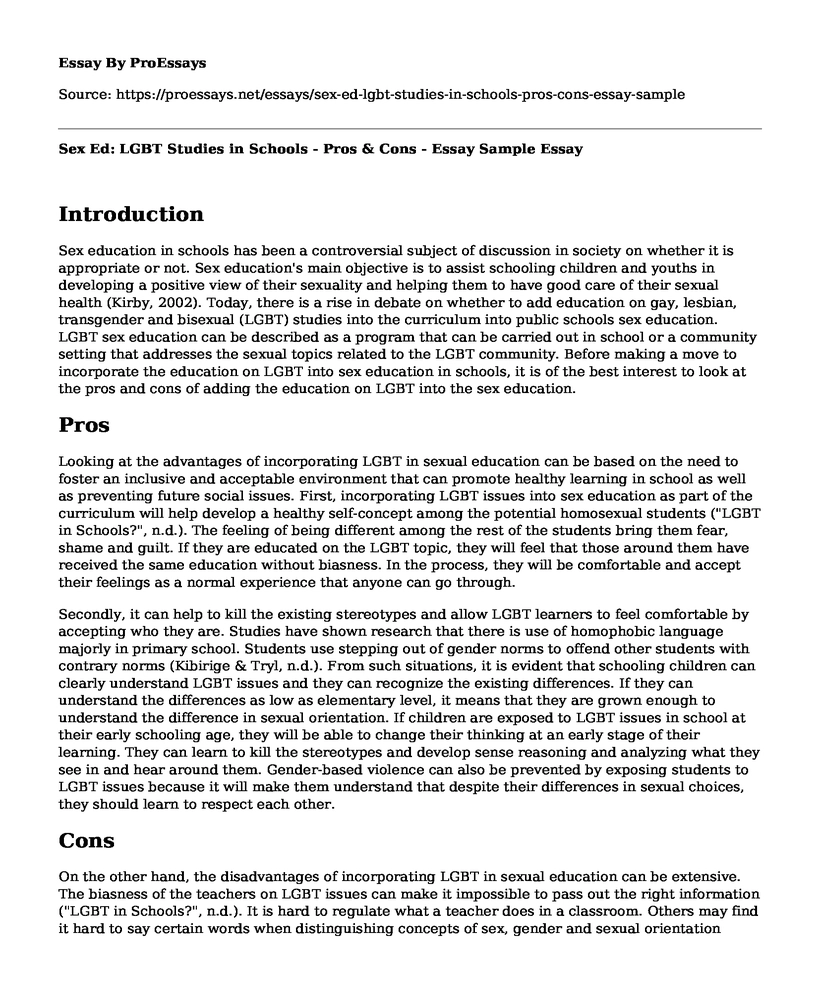Introduction
Sex education in schools has been a controversial subject of discussion in society on whether it is appropriate or not. Sex education's main objective is to assist schooling children and youths in developing a positive view of their sexuality and helping them to have good care of their sexual health (Kirby, 2002). Today, there is a rise in debate on whether to add education on gay, lesbian, transgender and bisexual (LGBT) studies into the curriculum into public schools sex education. LGBT sex education can be described as a program that can be carried out in school or a community setting that addresses the sexual topics related to the LGBT community. Before making a move to incorporate the education on LGBT into sex education in schools, it is of the best interest to look at the pros and cons of adding the education on LGBT into the sex education.
Pros
Looking at the advantages of incorporating LGBT in sexual education can be based on the need to foster an inclusive and acceptable environment that can promote healthy learning in school as well as preventing future social issues. First, incorporating LGBT issues into sex education as part of the curriculum will help develop a healthy self-concept among the potential homosexual students ("LGBT in Schools?", n.d.). The feeling of being different among the rest of the students bring them fear, shame and guilt. If they are educated on the LGBT topic, they will feel that those around them have received the same education without biasness. In the process, they will be comfortable and accept their feelings as a normal experience that anyone can go through.
Secondly, it can help to kill the existing stereotypes and allow LGBT learners to feel comfortable by accepting who they are. Studies have shown research that there is use of homophobic language majorly in primary school. Students use stepping out of gender norms to offend other students with contrary norms (Kibirige & Tryl, n.d.). From such situations, it is evident that schooling children can clearly understand LGBT issues and they can recognize the existing differences. If they can understand the differences as low as elementary level, it means that they are grown enough to understand the difference in sexual orientation. If children are exposed to LGBT issues in school at their early schooling age, they will be able to change their thinking at an early stage of their learning. They can learn to kill the stereotypes and develop sense reasoning and analyzing what they see in and hear around them. Gender-based violence can also be prevented by exposing students to LGBT issues because it will make them understand that despite their differences in sexual choices, they should learn to respect each other.
Cons
On the other hand, the disadvantages of incorporating LGBT in sexual education can be extensive. The biasness of the teachers on LGBT issues can make it impossible to pass out the right information ("LGBT in Schools?", n.d.). It is hard to regulate what a teacher does in a classroom. Others may find it hard to say certain words when distinguishing concepts of sex, gender and sexual orientation making it hard for teachers to pass out information.
The beliefs that surround LGBT can also influence the way the teachers give students the information. Certain beliefs such as sex for procreation has challenged the introduction of LGBT issues on sex education. Teachers should not be allowed to new ideas to the students that can affect their choice of sexual orientation. Same-gender sex is seen as something unnatural that can lead to the end of human society ("LGBT in Schools?", n.d.). Students who will be influenced by the LGBT issues can decide to be either gays or lesbians which cannot contribute to reproduction.
Parents are the central point of the cons of introducing LGBT issues in sex education. Universal Declarations of Human Rights give parents the right to choose the kind of education that their children should receive ("Universal Declaration of Human Rights," 2013). Parents have a right to stick to their own beliefs and teachings at school should not contradict with what they teach their children at home. Forcing children to be taught topics such as homosexuality in school is not acceptable because this will violates parent's right which is against Human Rights.
References
Kirby, D. (2002). Effective approaches to reducing adolescent unprotected sex, pregnancy, and childbearing. Journal of sex research, 39(1), 51-57.
LGBT in Schools?. Retrieved 10 February 2020, from https://lgbtinschools.weebly.com/index.html
Kibirige, H., & Tryl, L. Tackling homophobic language. Retrieved 10 February 2020, from https://www.stonewall.org.uk/sites/default/files/tackling_homophobic_language_-_teachers_guide.pdf
Universal Declaration of Human Rights. (2013). Retrieved 10 February 2020, from https://www.un.org/en/universal-declaration-human-rights/index.html
Cite this page
Sex Ed: LGBT Studies in Schools - Pros & Cons - Essay Sample. (2023, Apr 04). Retrieved from https://proessays.net/essays/sex-ed-lgbt-studies-in-schools-pros-cons-essay-sample
If you are the original author of this essay and no longer wish to have it published on the ProEssays website, please click below to request its removal:
- The CCSS Standards in Kindergarten
- My Street: 11 Linden Court
- Sexual Response Cycle According To Masters and Johnson
- Education Essay Example: Seven Principles of the Best Learning Experience
- Essay on Children Education in Homeless Families
- Classroom Diversity Essay Example
- Paper Example on Vaping: A Growing Risk for Students?







